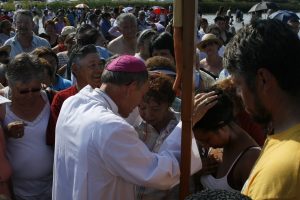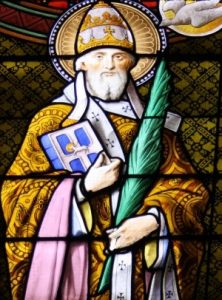Living in Balance – Memorial: St. Fabian
(2 Sam 1:1-27; Ps 80; Mk 3:20-21)
***************************************
“Among yourselves, charity, charity, charity, and for others, zeal for souls.”
Those are the words of St. Eugene de Mazenod, founder of the Oblates of Mary Immaculate, to the members of his congregation as he lay dying. They touch on the readings for today that speak of good grieving, zeal for ministry, and the importance of prayer.
St Eugene de Mazenod
David, in the first reading, is a powerful example of good grieving. His response to the news of the deaths of King Saul and his son Jonathan was to move directly into mourning that great loss. “David took hold of his clothes and tore them; and all the men who were with him did the same. They mourned and wept, and fasted until evening.” These men were not afraid to cry, to let tears flow.
Those who are unable to mourn and grieve run the danger of being stuck in grief. In one of my earlier missions, a young man took his life a year to the day that his older brother had taken his life. He was stuck in grief, and it proved fatal for him. He did not know now to let go of his loss.
Grieving is more private; mourning is more public. Both are needed and good. To ritualize our losses in a public way helps us to let go of them. Grieving involves practicing a spirituality of letting go. Another biblical incident that teaches us about good grieving is the appearance of Jesus to Mary Magdalene. She wanted to hug him, to have him back, but Jesus told her, “Do not cling to me, Mary, for I have not yet ascended to my Father.” He was teaching her, and the other disciples to grieve and mourn his loss. They could not have him back the way they had him before – he had changed.
Resurrection was not resuscitation – he had risen to a new, glorious, eternal life that he wanted to share with them, and with us. But they would not be able to receive that new life unless they would let go and let him ascend to the Father. Then he would send his Spirit to them, which he did at Pentecost, when they were transformed into the church, his Body. They did not miss him because he was with them in a new way.
It is the same with us. If we hang on to our loved ones and try to get them back, we will not be able to move on with our lives. But if we can grieve and mourn their loss as much as we need to (forty days symbolizes the time needed to bring something to completion), and eventually give our loved one’s back to God, then we will be able to receive their spirit to be with us in new way. We won’t miss them because we will feel their presence.
The gospel is all about zeal for ministry. Jesus was so focused on pouring himself out in ministry, teaching, healing, praying long hours, too busy to eat at times, that his family was genuinely concerned about him. What an impact his unique approach to ministry must have had on people, that some would even claim he had gone out of his mind! Many a missionary has been moved to action and the desire to share the Good News of salvation as Jesus was over the centuries. St. Eugene de Mazenod certainly was one of those.
There are times when I can remember the demands of ministry being so great that there literally was no time to eat. As a young Oblate in my first mission, I heard confessions on Christmas Eve from 5:30 pm to just before midnight mass, thinking there would be a break, but there wasn’t. At Lac St Anne, it has happened that the press of people wanting to celebrate reconciliation has meant no time for a meal.

Praying with people in the water
The danger of this zeal for ministry is that one can overdo it and lose one’s self in work. That is where prayer becomes important. Actually, the ideal is to find a balance of ministry, recreation, prayer and relationships. All four are important and can have an equal claim on our time. Time spent in prayer and contemplation is not wasted – it is an investment in wellness, and also can be seen as developing a more intimate relationship and friendship with Jesus, who after all, should be our best friend.
Today the church celebrates the optional memorial of St. Fabian. Fabian succeeded St Anterus as pope in 236. The historian Eusebius describes Fabian’s election as pope: Fabian was a layman and a stranger in Rome at the time of the election. When a dove settled upon his head, those around him were reminded of the descent of the Holy Spirit on Jesus at his baptism. That event was seen as divine intervention. Fabian was chosen the 20th pope and served for 14 years. He was martyred during a persecution in 250. St. Cyprian records that Fabian was an “incomparable man.” His tombstone can still be seen in the catacomb of St. Callixtus in Rome.

St Fabian, Pope and Martyr
The Eucharist is actually a vigil, a waiting until Jesus comes again. It is also a memorial meal, during which we remember how Jesus died for us. It is our greatest prayer that fills us with zeal for ministry, and empowers us to go out as Jesus did to share his Good News with all the world. It is that zeal that inspired our founder, St. Eugene, to gift us with our motto as Oblates, “Evangelizare pauperibus misit me” – “He has sent me to evangelize the poor.”
May our celebration today help us mourn our losses in a healthy way, deepen our intimate relationship with Jesus in prayer, balance our lives with recreation and relationships, and empower us to go out and evangelize the world.




Bishop thanks for the full detail homily and messages on balancing our lives with recreation and relationships. Mourning our loss is public and intimate relationship with Jesus is private. Your messages expresses all what the Gospel reading is about and learning about the Saint. Thanks again
We should go out evangelize and proclaim the good news of the Lord. This is what Jesus wants us to do and this is the way to follow him and trust him. Jesus is always out there healing people, cleans lepers , cast out demons and repent. He always help people who are in need, if we choose to believe in him. We have to start to believe in ourselves and trust ourselves which is part of the readings this Sunday mass. Thank you Thank you Bishop. Blessings!